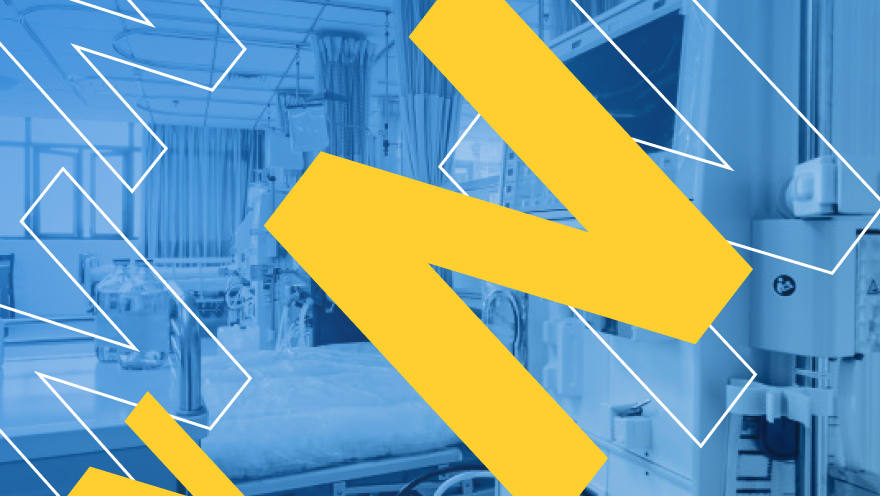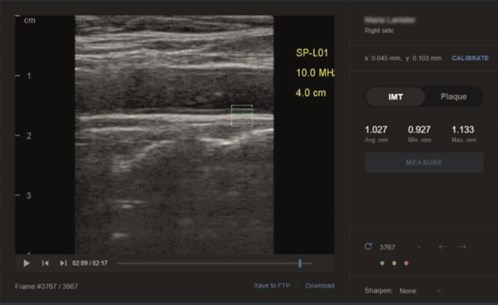Neural networks read medical scans without human input
A Machine Learning based solution allows to automatically search for cholesterol plaques in the cervical arteries in ultrasound scanning results. Figure out how it helped the US medical company to speed up transcripts by a factor of 5.

Health Samurai, an independent department of WaveAccess, has developed a module based on machine learning algorithms to automatically search for cholesterol plaques in the cervical arteries in ultrasound scanning results. The solution allowed for speeding up transcripts by a factor of 5. The project was commissioned by the US medical company, a supplier of a high-tech solution for assessing the condition of arteries. Processes automation has freed medical specialists from routine operations and relieved the company of the need to increase the number of costly professionals.
The solution for assessing the condition of cervical arteries includes a portable scanner and a detailed interpretation of scan results provided by experienced technicians. The service is delivered to US-based medical institutions, and physicians in private practices, by the company supplying the high-tech medical equipment. Previously, scan transcription specialists had to view the entire video recording – which is on average of five minutes long – checking the condition of the artery shot by shot to identify shots that require a doctor’s attention and to determine the presence of cholesterol plaques. Measuring the thickness of the artery wall and its diameter, determining the plaques shape, size and position were also performed manually.
It could have taken several hours to prepare a medical report. Standard software solutions did not allow for the automation of the process of "reading" scans – only a qualified specialist with a medical education could handle the decryption. With the number of users growing, the solution provider had to increase the staff of highly paid technicians, thus the cost of the service kept increasing. In the meantime, both the speed and quality of service have not changed. To make the system more competitive, the process needed to be optimized.
The problem was solved thanks to the machine learning based module that was developed by Health Samurai, an independent department of WaveAccess. The neural network helps to identify areas where arteries are located and detect cholesterol plaques. After being trained, the system has learned to distinguish the usual "noise" on the video recording from the anomaly and find the right shots with a high percentage of accuracy. The module divides a recording into separate shots and offers the technician 5 images of the highest quality with the most appropriate area for measuring the diameter of the artery wall. The system also offers a specialist 20 images of the artery with areas of interest indicated. Algorithms manage the task of decoding the recording and measuring the artery wall diameter with an accuracy of about 95%, with the task of finding shots with potential anomalies – with an accuracy of 80%.

The solution made it possible to enhance the efficiency of specialists by a factor of 5: now there is no need to view the entire recording – the shots required for the medical assessment report are provided automatically. In addition, the error probability associated with the human factor has decreased. As a result, the solution to assess the condition of arteries has become more competitive: doctors – users of the scan results’ decoding service – get a more accurate result over a shorter period of time.
“It required close cooperation between our programmers and doctors to develop such a solution. Medical specialists were themselves training a module within the first implementation phase: they’ve been browsing footage manually, pointing out the anomalies, assessing the quality of the module-made solutions and telling, what is missed in data. The data was prepared manually, which required greater attention of specialists from both sides”, Alexander Azarov, Senior Vice President of Engineering at WaveAccess.
WaveAccess creates similar machine learning based modules to examine abnormal user behavior with a determination to protect data, the same solutions are used for “smart” recommendations in online stores, to calculate the probability of an insured event, to predict the probability of buying and other business tasks.
Find out more about the project in our case.
Let us tell you more about our projects!
Сontact us:
hello@wave-access.com
















